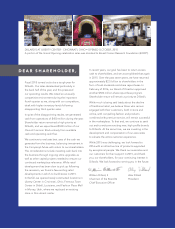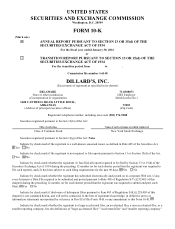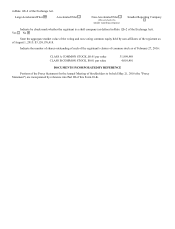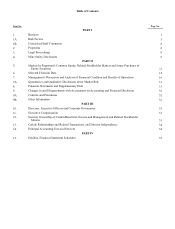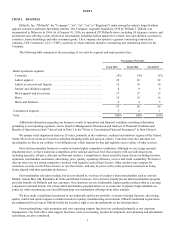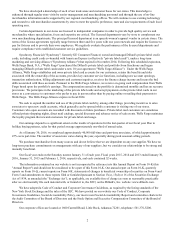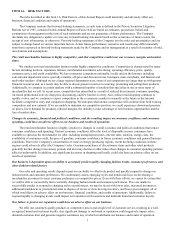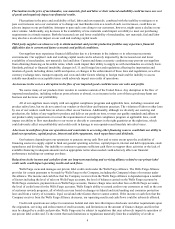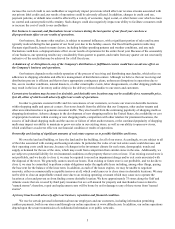Dillard's 2015 Annual Report Download - page 12
Download and view the complete annual report
Please find page 12 of the 2015 Dillard's annual report below. You can navigate through the pages in the report by either clicking on the pages listed below, or by using the keyword search tool below to find specific information within the annual report.6
We have a longstanding Information Security Program committed to regular risk assessment practices surrounding the
protection of confidential data. This program includes network segmentation and access controls around the computer resources
that house confidential data. We continue to evaluate the security environment surrounding the handling and control of our
critical data, especially the private data we receive from our customers, and we institute additional measures to help protect us
from a privacy breach.
Despite our security measures, it is possible that unauthorized persons (through cyberattacks, which are evolving and
becoming increasingly sophisticated, physical breach or other means) might defeat our security measures, those of Wells Fargo
or of our other third party service providers or vendors, and obtain personal information of customers, employees or others. We
have purchased Network Security and Cyber Liability insurance to provide some financial protection should a privacy breach
occur; however, such a compromise, whether in our information security system or our third party service providers or vendors,
resulting in personal information being obtained by unauthorized persons could adversely affect our reputation with our
customers, employees and others, as well as our operations, results of operations, financial condition and liquidity, and could
result in litigation against us or the imposition of penalties. In addition, a security breach could require that we expend
significant additional resources related to our information security systems and could result in a disruption of our operations,
particularly our online sales operations.
Litigation with customers, employees and others could harm our reputation and impact operating results.
In the ordinary course of business, we may be involved in lawsuits and regulatory actions. We are impacted by trends in
litigation, including, but not limited to, class-action allegations brought under various consumer protection, employment, and
privacy and information security laws. Additionally, we may be subject to employment-related claims alleging discrimination,
harassment, wrongful termination and wage issues, including those relating to overtime compensation. We are susceptible to
claims filed by customers alleging responsibility for injury suffered during a visit to a store or from product defects, and we are
also subject to lawsuits filed by patent holders alleging patent infringement. These types of claims, as well as other types of
lawsuits to which we are subject from time to time, can distract management's attention from core business operations and
impact operating results, particularly if a lawsuit results in an unfavorable outcome.
Our profitability may be adversely impacted by weather conditions.
Our merchandise assortments reflect assumptions regarding expected weather patterns and our profitability depends on
our ability to timely deliver seasonally appropriate inventory. Unexpected or unseasonable weather conditions could render a
portion of our inventory incompatible with consumer needs. For example, extended periods of unseasonably warm
temperatures during the winter season or cool weather during the summer season could render a portion of the Company's
inventory incompatible with those unseasonable conditions. Additionally, extreme weather or natural disasters, particularly in
the areas in which our stores are located, could also severely hinder our ability to timely deliver seasonally appropriate
merchandise. For example, frequent or unusually heavy snowfall, ice storms, rainstorms or other extreme weather conditions
over a prolonged period could make it difficult for the Company's customers to travel to its stores and thereby reduce the
Company's sales and profitability. A reduction in the demand for or supply of our seasonal merchandise or reduced sales due to
reduced customer traffic in our stores could have an adverse effect on our inventory levels, gross margins and results of
operations.
Natural disasters, war, acts of terrorism, other armed conflicts, and public health issues may adversely impact our business.
The occurrence of, or threat of, a natural disaster, war, acts of terrorism, other armed conflicts, and public health issues
could disrupt our operations, disrupt international trade and supply chain efficiencies, suppliers or customers, or result in
political or economic instability. If commercial transportation is curtailed or substantially delayed our business may be
adversely impacted, as we may have difficulty shipping merchandise to our distribution centers, fulfillment centers, stores, or
directly to customers. As a result of the occurrence of, or threat of, a natural disaster or acts of terrorism in the United States,
we may be required to suspend operations in some or all of our stores, which could have a material adverse impact on our
business, financial condition, and results of operations.
Increases in the cost of employee benefits could impact the Company's financial results and cash flows.
The Company's expenses relating to employee health benefits are significant. Unfavorable changes in the cost of such
benefits could impact the Company's financial results and cash flows. Healthcare costs have risen significantly in recent years,
and recent legislative and private sector initiatives regarding healthcare reform could result in significant changes to the U.S.
healthcare system. Many of our employees who currently choose not to participate in our healthcare plans may find it more
advantageous to do so as a result of recent changes to healthcare laws in the United States. Such changes include potential
penalties on persons for not obtaining healthcare coverage. Additionally, employees may be ineligible for certain healthcare
subsidies if such employee is eligible and offered qualifying and affordable healthcare coverage under an employer's plan. If a
large portion of eligible employees who currently choose not to participate in our plans choose to enroll as a result of the law


